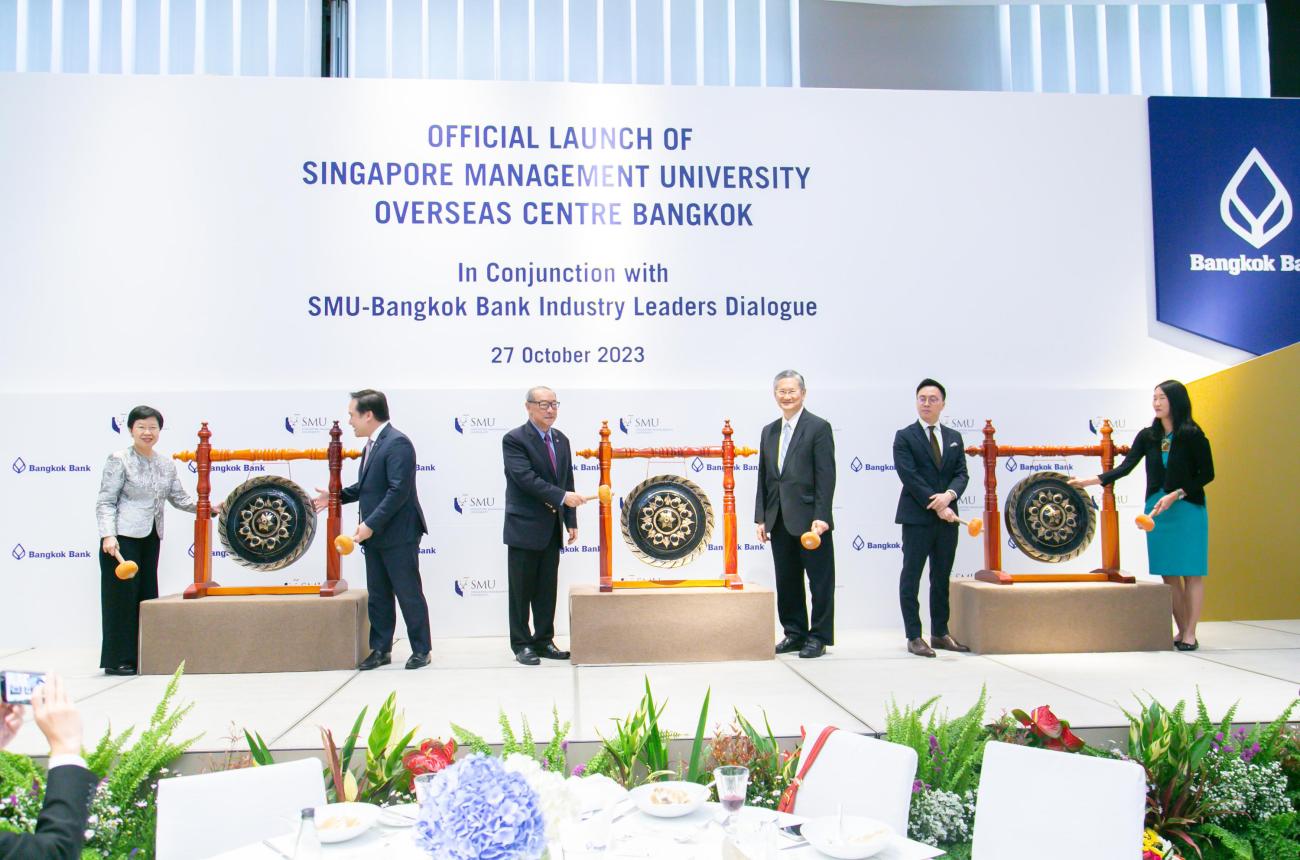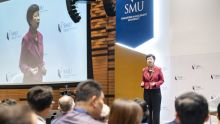
Aligned with SMU’s “Growth in Asia” strategic priority and its continued commitment to provide high-quality education and contribute to regional development, the University inaugurated its latest Overseas Centre in bustling Bangkok, Thailand on 27 October 2023.
The establishment of Overseas Centre Bangkok (OCB) marks the University’s second regional presence, with the first launched in Jakarta, Indonesia in December 2022., SMU plans to launch its third Overseas Centre in Ho Chi Minh City, Vietnam next year.
These Overseas Centres (OCs) are part of SMU’s strategy to create vibrant eco-systems for knowledge sharing. The centres are in some ways embassies – embedded in the local economy and community of each location, enabling the delivery of in-country solutions and programmes. They also aim to play a pivotal role in elevating SMU’s international reputation.
OCB is poised to be a dynamic hub that will bridge the gap between academia and industry; developing human capital through tailored continuing-education programmes. At the same time, it aims to attract talents to pursue advanced studies at SMU while championing innovation, leadership, and sustainability initiatives in the region.
“OCB’s role encompasses the cultivation of new relationships and the nurturing of existing networks with corporations in Thailand,” expresses Centre Director Celine Kuok.
“We endeavour to play an active role in building a future-ready workforce for the D-VUCAD (disruption, volatility, uncertainty, complexity, ambiguity and diversity) world.”
The benefits of strengthening regional collaboration
In recent years, Thailand has emerged as the second largest economy in Southeast Asia, becoming an economic powerhouse that fuels the region’s growth and development. Furthermore, the Thai government’s goals to promote investment, foster innovation and advance technology align with SMU’s areas of expertise.
These factors have provided a strong rationale for SMU to establish a representative office in Thailand. The University hopes that Thailand stands to gain from the partnerships that are inked through the efforts of OCB.
“The selection of Thailand as the location for our second Overseas Centre is the result of both strategic intent and strong relationships with our Thai partners,” SMU President Professor Lily Kong said. “SMU is committed to making a meaningful impact on local communities and economies in Asia through education, research, and innovation, and OCB is a testament to our dedication to knowledge-sharing and positive community impact in this dynamic region.”
The Thai government has placed emphasis on automation and digitalisation – goals which align with the suite of programmes offered by the SMU Academy and Executive Development, the professional training arms of SMU.
For SMU, OCB will serve as a vital node for collaboration in Thailand – it will empower the forging of various corporate partnerships, while also deepening cooperation with Thailand’s institutes of higher learning, fuelling teaching and research partnerships especially in the fields of innovation and entrepreneurship.
“To actively engage the business community, OCB will host thematic events and webinars, providing a dynamic platform for business leaders and academics to exchange insights and explore emerging trends in innovation, technology and strategic digital transformation,” shares Ms Kuok.
One of SMU’s established partnerships in Thailand is with the Thailand Management Association, with a focus on offering soft and technical skills to working professionals. With SMU being a key strategic partner in the ASEAN Universities Network, the university is at the forefront of enhancing human capital and elevating education quality across the region.
A transformative force for SMU
To achieve its goal of creating a vibrant eco-system of thought leadership sharing, OCB has devised a few initiatives that will have a lasting impact.
As a one-stop shop, OCB will offer comprehensive support to students, faculty, and partners through a single point of contact. OCB will also work closely with SMU’s other OCs, enabling the quick detection of emerging trends, and putting in place of best practices in a timely manner.
Collectively, the Overseas Centres serve as platforms for higher-education institutions and corporations to network and deliberate on issues unique to operating in Asia.
Functioning as on-the-ground ‘eyes and ears’, Overseas Centre Bangkok will remain connected to the latest in-country developments, providing timely and accurate market intelligence to craft custom-tailored, market-focused propositions.
The establishment of OCB is a testament to SMU’s commitment to shaping the future of education and collaboration in Asia: the visionary approach and strategic partnerships, paired with a dedication to innovation will make the University’s OCs transformative forces in the region.


